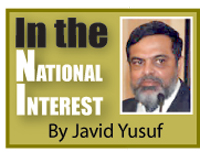In the National Interest
Deteriorating political culture helps passage of the 20th Amendment
View(s):The passage of the 20th Amendment in Parliament last Thursday reflects the growing deterioration of the political culture in the country. Notwithstanding the obnoxious and anti-democratic features of the amendment it is increasingly becoming evident from the information reaching the public domain that the Constitutional Amendment could have been defeated if not for the unprincipled opportunism of some of the country’s political actors.
Such deterioration in political behaviour is indeed cause for great concern and unless arrested and reversed can result in great harm to the country. Of course this drop in standards in the polity is not new and has been increasingly evident over a period of time.
There have been occasions in the past when Sri Lankan politicians have taken principled stands and given up positions in Government. They never feared to take decisions based on policy and did so moving from Government to Opposition when the situation demanded.
Two immediate examples immediately come to mind. The first was in 1976 when the Lanka Sama Samaja Party left the Sirimavo Bandaranaike led United Front Government over policy differences foregoing their ministerial portfolios.
The second was when Gamini Jayasuriya resigned his ministerial portfolio over his disapproval of the 13th Amendment of the J. R. Jayewardene government.
But today the political traffic invariably moves in the opposite direction. Almost every change in political alliances has been from the Opposition towards the Government. It invariably results in positions and perks for those who switch allegiances to the Government and gives rise to speculation that there may have been monetary and other considerations that came to play to ensure such crossovers.
In fact an Island newspaper report dated October 22, reveals that according to Minister Wimal Weerawansa, his members had been offered a range of perks and privileges if they give up their campaign against the proposed move to pave the way for dual citizens to enter parliament.
According to the information now surfacing the Government would have been hard put to obtain the two third majority required if not for the fickleness of several politicians.
While former President Maithripala Sirisena stayed away from the voting after informing the Government that he could not vote in all conscience for the 20th Amendment, the rest of the SLFP Parliamentarians supported the 20th Amendment without following their leader.
 This was despite the position articulated in an interview on social media by the SLFP Vice President Professor Rohana Lauxman Piyadasa that the SLFP was against the 20th Amendment. In his interview, Professor Piyadasa said the SLFP’s position was that what was needed was a new Constitution and not the 20th Amendment.
This was despite the position articulated in an interview on social media by the SLFP Vice President Professor Rohana Lauxman Piyadasa that the SLFP was against the 20th Amendment. In his interview, Professor Piyadasa said the SLFP’s position was that what was needed was a new Constitution and not the 20th Amendment.
The behaviour of the Muslim Parliamentarians is not in the least surprising. Many of them have in the past showed signs of being unable to resist the temptations of office and at different times have wanted to move from Opposition to Government.
Even as recently as in October 2018 at the time of the Constitutional crisis, several of them were yearning to cross over to the Government and the two leaders Rauff Hakeem and Rishad Bathiudeen were hard pressed to keep their flock together. To prevent those who wanted to cross over from doing so the two leaders were compelled to take them to Mecca on a pilgrimage and keep them away from temptation.
One of the Muslim Parliamentarians from the SJB who voted in favour of the 20th Amendment in fact had indicated to his associates before the General Elections that his plan was to contest from the SJB and thereafter join the Government.
In stark contrast to the actions of the Muslim Parliamentarians who voted for the 20th Amendment was the role of SJB Parliamentarian Imthiaz Bakeer Markar.
Opening the debate for the Opposition he made an outstanding speech reminiscent of the heyday of Sri Lankan Parliament. He made a moving plea to his Parliamentary colleagues pointing out the dangers of the 20th Amendment and calling upon them to oppose the Constitutional Amendment.
It is worth noting that at the height of the Mahinda Rajapaksa Government’s power Imthiaz Bakeer Markar declined an invitation to be Sri Lanka’s Ambassador to Saudi Arabia. The Muslim Parliamentarians who switched allegiances on Thursday could well take an example on principled politics from Bakeer Markar and conduct themselves in a manner so as to win the respect of all communities as the latter has done.
The opposition from within the Government ranks, the clergy and civil society should have sensitised the Opposition Parliamentarians to the dangers of the 20th Amendment and caused them to refrain from such a volte face with far reaching consequences to the country.
It is interesting to see how the voters who chose these Parliamentarians as their representatives would react to their conduct in Parliament. One presumes they voted for them on the basis of certain values and policies. Continuing to send Parliamentarians who are opportunistic and self serving to the Legislature can hardly serve the interest of the voters or that of the country.
The Government too for its part did not mind eating its own words. During the Election campaign, to attract the Sinhalese votes, it relentlessly attacked the SLMC and ACMC as extremists and said they would never be absorbed into the Government. However to pass the 20th Amendment the support of the MPs of these two parties was accepted with open arms.
From a national perspective, social acceptance of a fall in political values in a society, hardly gives hope for progress. The sooner steps are taken to arrest and change this trend, the better.
(javidyusuf@yahoo.com)


Leave a Reply
Post Comment